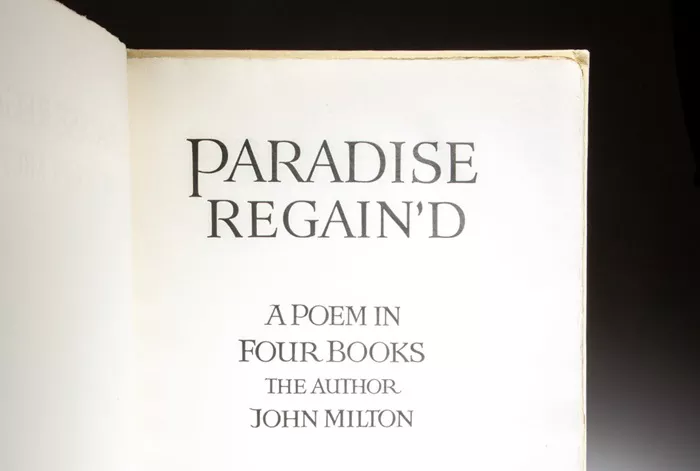Welcome to Poem of the Day – Paradise Regained by John Milton.
Paradise Regained is an epic poem by John Milton, written in blank verse, which follows the narrative of Jesus Christ’s temptation by Satan in the wilderness. It is a companion piece to Milton’s earlier Paradise Lost, but while Paradise Lost focuses on the fall of man, Paradise Regained centers on Christ’s victory over temptation, symbolizing the possibility of redemption and salvation for humankind. In this poem, Milton explores themes of temptation, virtue, and divine intervention, presenting a spiritual triumph over moral corruption.
Paradise Regained Poem Explanation
The poem begins with Satan’s return to confront Jesus, after having been cast out of Heaven. In the wilderness, Satan attempts to corrupt Christ by offering him worldly power and wealth. However, Christ resists each temptation, affirming his spiritual mission and devotion to God. Throughout the poem, Milton presents Christ’s resistance to Satan’s temptations as a model for human strength in the face of adversity.
Each temptation Jesus faces mirrors common struggles that humans experience, such as the temptation to gain power, wealth, or fame. Christ’s unwavering commitment to his divine purpose highlights the contrast between material pursuits and spiritual fulfillment. By overcoming these temptations, Christ not only demonstrates his own divine nature but also offers hope for the salvation of humanity, showing that virtue and righteousness can lead to ultimate victory.
Structure and Form
Paradise Regained is written in blank verse, which consists of unrhymed iambic pentameter. This form allows Milton to present the narrative with a formal and elevated tone, befitting the sacred nature of the subject matter. Blank verse also provides a sense of fluidity and grandeur, enhancing the epic quality of the poem while maintaining a natural rhythm.
The poem is divided into four books, each focusing on a specific temptation Christ faces and his subsequent triumph. Milton’s use of blank verse and his careful structuring of the poem contribute to its sense of solemnity and its meditation on spiritual and moral strength.
Detailed Explanation of Major Elements
Imagery:
Milton uses vivid imagery throughout Paradise Regained to evoke the stark contrast between spiritual purity and worldly temptation. The wilderness setting, where Christ faces Satan, symbolizes isolation and the struggle for purity in a world filled with distractions. Milton also uses imagery of light and darkness, contrasting Christ’s divine nature with Satan’s darkness and deceit. This imagery serves to emphasize the struggle between good and evil, with Christ symbolizing light and salvation, and Satan representing temptation and corruption.
Tone:
The tone of Paradise Regained is solemn, reflective, and reverent. The poem’s elevated language conveys a sense of divine importance, as it addresses the biblical story of Christ’s triumph over temptation. However, there is also an undercurrent of hope and resilience, especially in the way Christ resists the temptations. The tone encourages the reader to consider the power of virtue and the possibility of redemption.
Symbolism:
Several key symbols emerge in Paradise Regained, such as the wilderness, which represents a place of spiritual trial and moral testing. The three temptations faced by Christ—worldly power, wealth, and fame—are symbolic of the distractions and false promises of earthly life. Christ’s refusal to accept these temptations represents his adherence to higher, spiritual values and his rejection of materialistic pursuits.
Satan’s role in the poem is also symbolic, embodying the forces of temptation and sin that seek to draw humanity away from God. Christ’s resistance to Satan serves as a model for how individuals can overcome personal temptations and remain true to their faith and moral principles.
Theme:
The central theme of Paradise Regained is the triumph of spiritual virtue over worldly temptation. Through Christ’s example, Milton explores how strength of character, rooted in faith and devotion to God, can overcome even the most alluring material temptations. Another important theme is redemption. While Paradise Lost focuses on the fall of humanity, Paradise Regained highlights the possibility of spiritual redemption through Christ’s victory over sin. This theme emphasizes the hope of salvation and the power of divine intervention in human lives.
Conclusion
Paradise Regained offers a powerful exploration of temptation, virtue, and the triumph of righteousness. Through the figure of Christ, Milton presents a model of moral strength and spiritual integrity in the face of worldly desires. The poem’s structure, form, and imagery work together to create a solemn yet hopeful meditation on the possibilities of redemption and the enduring power of divine virtue. Ultimately, Paradise Regained serves not only as a theological treatise but also as an exploration of the human condition, offering readers the hope that, through strength and faith, they too can overcome temptation and achieve spiritual victory.

